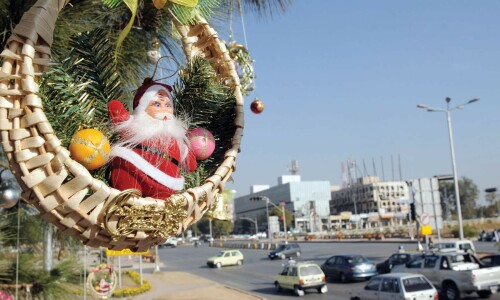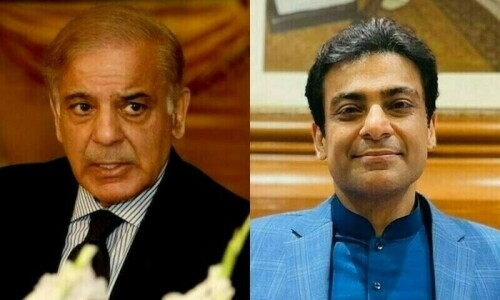 Experts predict the next year to be difficult for the world economy. For Pakistan, it seems, the worst is nearing an end as 2008 closes. The year 2009 may be comparatively more productive for the businesses and the people. It is, however, imperative that war mongers are kept at bay by the people of the region.
Experts predict the next year to be difficult for the world economy. For Pakistan, it seems, the worst is nearing an end as 2008 closes. The year 2009 may be comparatively more productive for the businesses and the people. It is, however, imperative that war mongers are kept at bay by the people of the region.
The current government can use the democratic dividends to negotiate a turnaround and make 2009 a year of economic renewal. This would generate goodwill among the multitude, necessary for the success of an elected government. The economic development that benefits the majority nurtures democratic dispensation.
While the humbled world is bracing to contain the fallouts of the most serious financial crisis since the Great Crash of 1929, like many other developing countries that were relatively immune, Pakistan did not receive a direct hit.
The international financial crisis that originated from the US subprime mortgage market spread to London, to Berlin, to Paris, to Iceland, to Russia, to China, to Japan, and to Dubai among others, and brought many corporate giants to their knees. It had a direct relation to the size of the economy and the level of integration in the global market. The relatively small economies and marginal integration proved to be a bliss in disguise for the developing world.
There are reasons to believe that for Pakistan the FY2009 may actually prove to be better than FY08 at the macro level. The balance of payment position, inflation situation and the value of currency may all improve. After hitting rock bottom, the capital market and real estate may get stabilised. Inflation may fall and trade deficit shrink gradually over the year.
The investment levels may not improve unless the internal law and order and relations with India and Afghanistan begin to normalise. The political stability, to a great extent, depends on the internal and external security.
The domestic and the foreign investment will pick up when stability is achieved. However, if innovative schemes to channelise idle resources are initiated to close the investment gap in industry and agriculture, economic indicators may start improving from the second quarter of FY2009.
With the easing out of harsh external factors, the performance of the economy in FY2009 will depend on the collective wisdom of the country’s team of economists. The team has been entrusted with the task of devising a workable economic plan for broad based development. The issue is not just stabilisation but also expansion and higher capital formation.
Some positive signals emanated when economists, in and outside the government, were inducted in the planning process in mid-FY2008. The measures taken so far to tackle the economic slow down, however, are not enough.
If a plan to prevent the slow down in the economy is not evolved and the pace of investment in the real sector does not improve, unemployment may become the single most important problem with multiple social and political implications.
More than the pace of growth, it would be the composition of the contributing sectors that may undergo a change over the year 2009. The share of agriculture is set to improve because of higher procurement prices for agriculture produce and improved availability of agricultural inputs.
There is a possibility of an increase in inter-provincial disparity gaining momentum with Punjab forging ahead under stewardship of its Chief Minister Shehbaz Sharif on the growth path while other provinces are bogged down by mismanagement and lack of ownership of development programmes in their fragmented societies.
There is little hope about the government delivering much on the social sector front, keeping resource constraints in view. The diversion of direct support funds (Zakat, Ushr and others) for the poor towards Benazir Support Programme and its distribution to the needy households through members of the Parliament may generate more controversies than goodwill for the government.
Besides, doles cannot compensate for the human resources being utilised in productive undertakings. A security net is absolutely necessary to save the poor from free fall but the thrust must be on helping them to earn their livelihoods.
The inflationary pressure is expected to ease as oil and commodity prices fall in the international market. The tight monetary policy and improvement in the supply situation of the essential commodities from the increased farm output will curb the price spiral and could bring prices of edibles down to, perhaps, tolerable levels.
The pressure on the current account may also ease somewhat because of reduction in the import bill. The import bill may fall because of cheaper oil and raw materials in the international market. Besides, higher duties on import of luxury items may suppress domestic demand.
According to an estimate, an average 50 per cent fall in the prices may lead to the reduction from high $20 billion in FY2008 to $11 billion in FY2009, assuming all other things remain the same.
If exporters succeed in relocating their exportable surplus to new markets in Afro-Asian region, the deficit can come down to a single digit. If the government succeeds in negotiating better market access in the EU and US markets, it could give the impetus needed to the textiles exports.
The hope for higher resource mobilisation through taxes looks too optimistic in the wake of the economic slow down. The collection from custom duty because of lower and cheaper imports will fall. Lack of inclination of the government to tax the agriculture income or the service sector will leave little manoeuvring space for the tax collection machinery to turn in more revenue. The tax-to-GDP ratio is not likely to improve in the immediate future.
After entering the IMF programme, confidence of global investors in the economy has improved. With macroeconomic stability, the country could qualify for more credit and grants from friendly countries.
To conclude, it is certainly not an easy situation as the impact of deepening world financial turmoil continues to unfold worldwide.
In Pakistan the weak institutions require that not just the government but the civil society must try to channelise resources to productive sectors for accelerated capital formation, development and quality growth.
However, if the current stabilisation concerns continue to overshadow the imperatives of a robust economic growth, the situation is likely to worsen.












































Dear visitor, the comments section is undergoing an overhaul and will return soon.